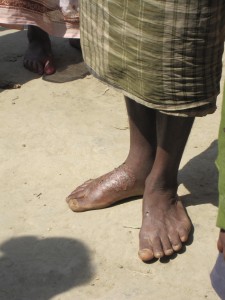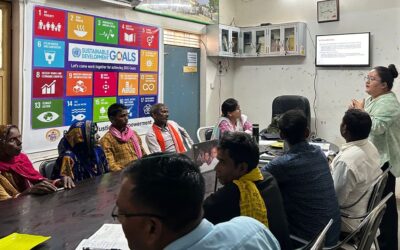Supriya Awasthi, FTS’ South Asia Director, and our local Indian partner, DDWS, have successfully secured the release of eleven bonded laborers, toiling, without pay, on the sugar cane fields of western Uttar Pradesh (U.P.), northern India.
Whilst surveying the work of DDWS in the state of Bihar, one of their fieldworkers informed Supriya about the case, which he had just found out about through local villagers.
Read: FTS on CNN: In India, Former Slaves Become Leaders
As it later transpired, some of the original twenty-two of the enslaved had already managed to escape, and several had been forced back to Bihar at the behest of their slave-owner, with the object of retrieving money from the human trafficker who had been responsible for their prior transportation to Bagpat district, U.P. The slaveholder had warned them that failure to bring him back the money from the trafficker would result in the murder of their relatives.
Reacting to the news that eleven still remained captive, Supriya hastily made her way to the village from which the bonded laborers had been recruited. Here she met with distressed family members of the victims and listened as the returnees recounted their experiences of enslavement.
According to their testimonies, the workers were forced to labor under the watchful eye of their armed captor and imprisoned in a single room during their non-working hours. One woman described how her husband was forced to watch as she was raped every other day. The potentially perilous consequences of attempting escape were meanwhile revealed by two villagers who detailed that their subsequent recapture at the hands of their slave-owner had resulted in one being tied to a signal pole and forced to watch his companion, tied to railway track, being crushed under a train. Fortunately the two men escaped death when a passerby noticed and untied them. But as soon as they were released, they were again recaptured, and re-enslaved.
Read: FTS on CNN: Raid & Rescue of Child Slaves Caught on Tape

Supriya’s immediate response to these accounts was to go straight away to meet with the district authorities and demand a police team be sent to investigate, that same day. She brought four of the villagers with her, so that they could make their statements to the officials. Hearing their evidence, the Sub-Divisional Magistrate readily admitted that this was indeed a case of modern day slavery. He contacted the police inspector of the village from which they had been trafficked. However, the inspector replied that since he had not received authorization from police headquarters, he was unable to proceed with an investigation.
Supriya, unwilling to concede defeat, headed directly to the police headquarters where, again, the villagers recounted their experiences. The villagers had in fact issued statements and registered the case with the local police previously, but nothing had been done. The chief of the district police told Supriya that the local police had already received orders to proceed with the case. Supriya was not convinced. She insisted that the superintendent re-write these orders for her then and there, and she then personally delivered the orders to the local police station.
Thanks to Supriya’s persistence, a breakthrough occurred when the police finally departed for Bagpat, accompanied by the DDWS District Coordinator and various family members of the enslaved. Meanwhile, the story was making front-page news in Bihar’s local media.
Arriving in Bagpat two days later, the team found the bonded laborers. The slaveholder’s reaction was to declare that these were in fact legitimate workers and would continue to receive wages. The laborers meanwhile appeared traumatized and terrified, refusing or unable to speak. After receiving encouragement from the DDWS representative however, they agreed to offer their statements to the local magistrate.
As a result, the remaining eleven secured their release certificates (showing that they were in bonded labor slavery and are entitled to financial compensation and other assistance) and they are all now safely back in Bihar. A legal case has been filed in Bihar against the trafficker and slaveholder, and another has been filed against the slaveholder in Uttar Pradesh under the Bonded Labor Act and Minimum Wages Act.



